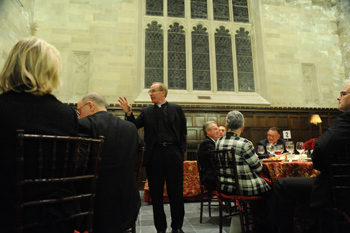
Photo by Chris Taggart
The University’s top benefactors gathered on Nov. 3 at the third annual Archbishop Hughes Society Dinner to honor the group’s newest inductees.
New members who were honored at the event in Tognino Hall included: Betty Burns (FCLC ’83); Jim (FCRH ’69) and Jane Flaherty; Tom Kaveler (LAW ’72) and Loretta Preska (LAW ’73); and Salvatore Romanello (LAW ’97) and Carmen DeGruttola (LAW ’97); who represented the law firm Weil Gotchal & Manges, LLP. They, along with 19 other individuals, couples, corporations and foundations were welcomed into what is now a 101-member society.
More than 80 guests attended the dinner and ceremony. John Tognino (FCLS ’75), chairman of the Fordham University Board of Trustees, thanked members for playing a major part in shaping Fordham’s future.
“This dinner embodies the spirit of our beloved University,” Tognino said. “Never before has Fordham heralded such promise as it does today. It is a promise that is inspired by its timeless values; its place at the crossroads of the world; and its restless attempt to realize its destiny.”
In his invocation, Patrick J. Ryan, S.J., the Laurence J. McGinley Professor of Religion and Society, brought attendees back to 19th-century Ireland. John Hughes, he noted, had just turned four when the English dissolved the Irish Parliament, an act that brought new restrictions against the island’s Catholic majority. As a result, when Hughes’ sister died, the family priest was barred from her graveside.
“He was so opposed to the Protestant-run school society that controlled all schools in New York, that he preferred that no religious instructions whatever be given in such schools. As a result, he is the real founder not only of Catholic education in the United States, but also, oddly enough, the secularity—not to say secularism—of American public schools,” Father Ryan said.
“He was no saint, nor was he the sinner he was made out to be by the nativists in New York who hated him,” he said. “Yet, by the time he died in 1864, the Irish must have had much more influence on the Common Council of New York, what we now call the City Council. The proclamation they issued on his death, elaborately framed and now located on a wall within the administration building, reads like a decree of canonization.”
Joseph M. McShane, S.J., president of Fordham, said the guests were the new founders of Fordham in the 21st century and the key to returning the University to pre-eminence among Catholic colleges.
“Fordham is not just a university. It really is a ministry and work of God,” Father McShane said. “It could not exist, it could not thrive, it could not continue to make the dreams of young men and women come true without your help.
“So this night, I not only acknowledge you as members of the Archbishop Hughes Society, I not only thank you for your generosity,” he said, “but this night, most importantly, I embrace you, and I thank you for being colleagues in the great and noble, important and sacred ministry: the ministry of transforming young men and women, one heart, one soul, one student at a time, so that they can in turn transform the world.”
